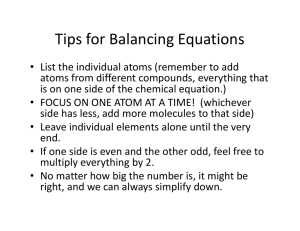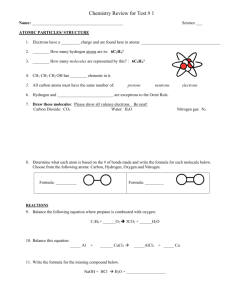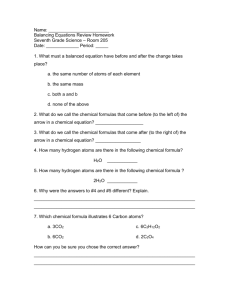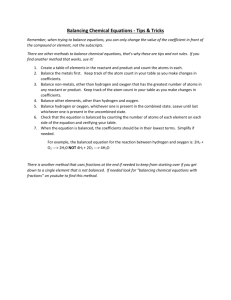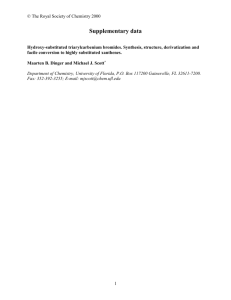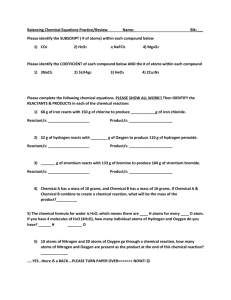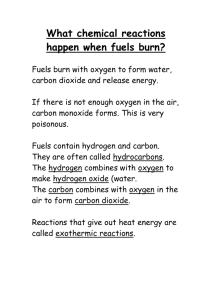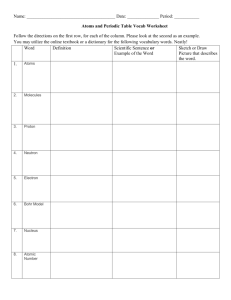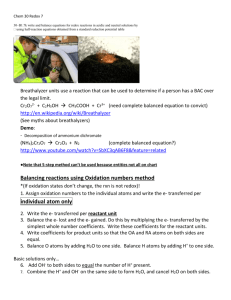CHEMISTRY
advertisement
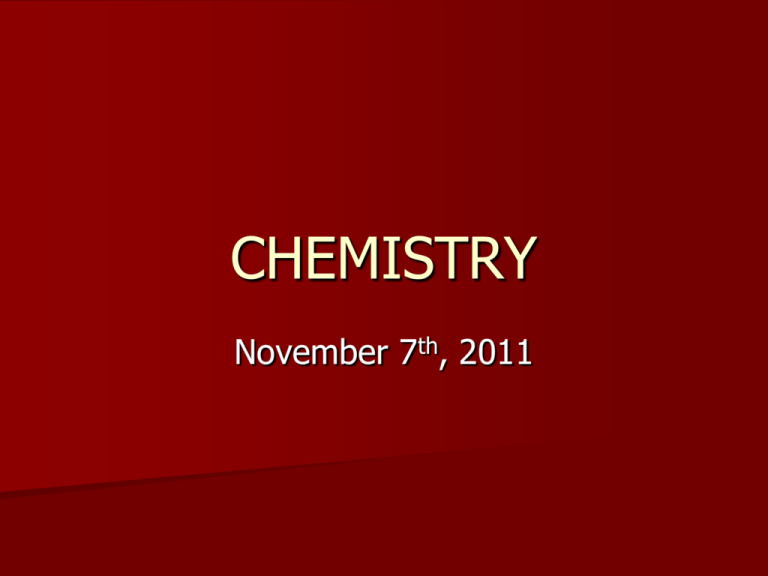
CHEMISTRY November 7th, 2011 Warm Up What is wrong with the following equation?? Can you fix it? HINT: think Law of Conservation of Mass H2 + O2 H2O CHEMISTRY LAUGHS Why does hamburger have lower energy than steak? Agenda Unit 7: Balancing Equation Practice Balancing Equation Word Equations Describes a chemical reaction that occurs using the names of the chemicals involved. Reactants versus Products An arrow is written between the reactants and products to indicate that chemical change is occurring – For example: 2H2 + O2 2H2O Balancing Equation Atoms involved in a chemical reaction must be balanced. – Same number of atoms of each element on both sides of a chemical equation. Unbalanced equation – Balance the equation by adding coefficients in front of the compounds Coefficients: number of molecules of a particular compound Subscripts: number of atoms of each element in the compound Balancing Equations A. B. From the word equation, write the correct formula for all reactants and products. If given an unbalanced equations first, balance the equation by using coefficients: 1. NEVER change the subscripts in the formula to balance the equation 2. Elements need to be balanced from either side of the equation 3. Start with the first element and work right of the equation 4. Balance the number of oxygen and hydrogen atoms after all the other elements have been balanced. Go back and double check that all elements are balanced D. BOX your coefficients when finished E. USE PENCIL only! (you will be erasing A LOT!) C. Balancing Equation Inspection Method Algebraic Method Practice and Reasoning Unbalanced Equation: – SnO2 + H2 → Sn + H2O Look at the equation and see which elements are not balanced. In this case, there are two oxygen atoms on the lefthand side of the equation and only one on the right-hand side. Correct this by putting a coefficient of 2 in front of water. – SnO2 + H2 → Sn + 2 H2O – SnO2 + H2 → Sn + 2 H2O This puts the hydrogen atoms out of balance. Now there are two hydrogen atoms on the left and four hydrogen atoms on the right. To get four hydrogen atoms on the right, add a coefficient of 2 for the hydrogen gas. Remember, coefficients are multipliers, so if we write 2 H2O it denotes 2x2=4 hydrogen atoms and 2x1=2 oxygen atoms. – SnO2 + 2 H2 → Sn + 2 H2O The equation is now balanced. Be sure to double-check your math! Each side of the equation has 1 atom of Sn, 2 atoms of O, and 4 atoms of H. Practice Problems __Fe + __Cl2 __FeCl3 __Cr + __O2 __Cr2O3 __Na + __H2O __NaOH + __H2 __Ca(CN)2 + __AlF3 __CaF2 + __Al(CN)3 Word Problem Potassium phosphate + Calcium hydroxide Calcium phosphate + Potassium hydroxide __K3(PO4) + __Ca(OH)2 __Ca3(PO4)2 + __KOH 2K3(PO4) + 3Ca(OH)2 __Ca3(PO4)2 Reactants K=6 P=2 Ca = 3 O = 14 H=6 + 6KOH Products K=6 P=2 Ca = 3 O = 14 H= 6 Homework Unit 7 Balancing Equation Worksheet 1
